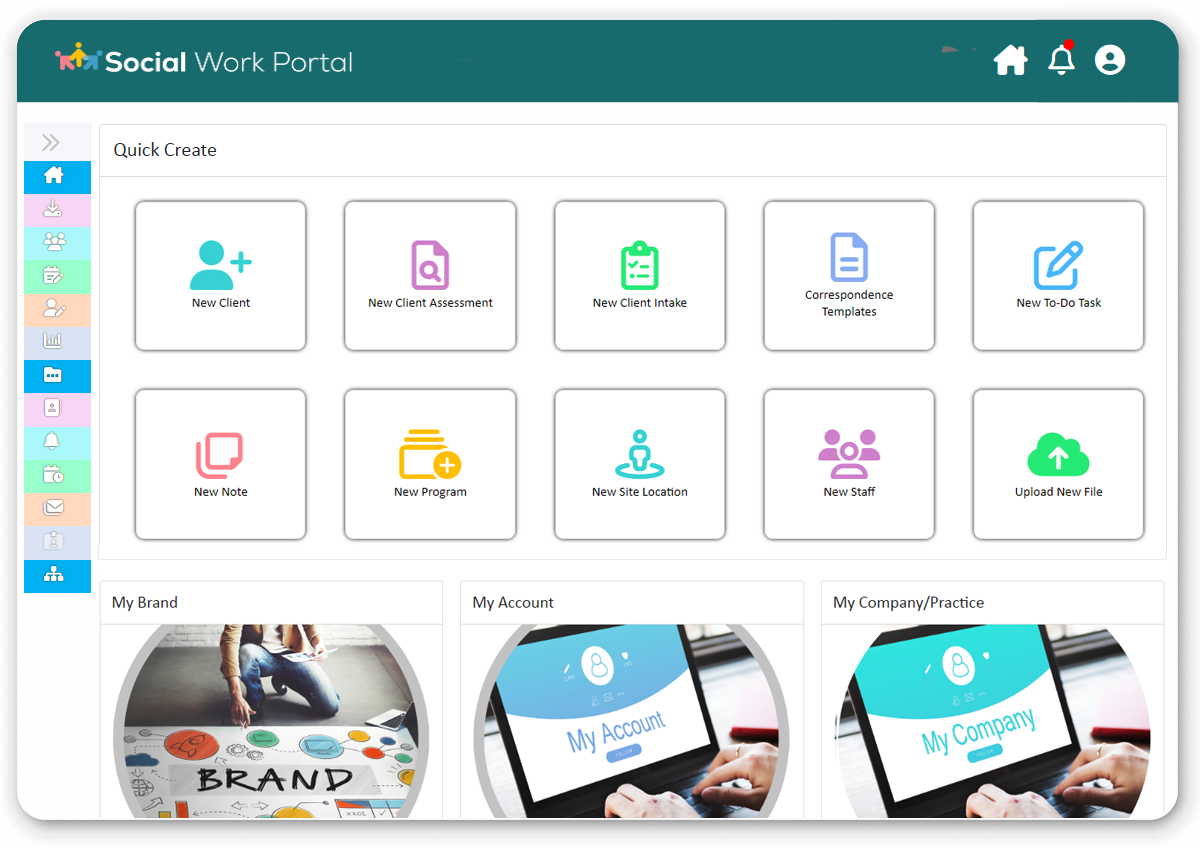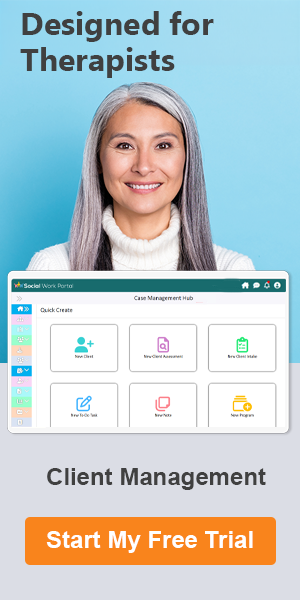Guide on Best Therapeutic Worksheets and Tools With Free Therapy Resources
Everything You Need to Know About Therapy Tools for Adults and Children
Therapy is a dynamic and multifaceted profession, requiring therapists to possess a diverse set of skills and strategies to effectively support their clients. In today’s digital age, therapists have access to an array of innovative therapy tools, templates, and therapy worksheets that can greatly enhance their therapeutic practices.
In this SWP article, we will go over the essential therapy tools and templates that therapists can utilize throughout different stages and types of therapy.
We will explore therapy intake assessment that aids in the comprehensive evaluation, treatment planning therapy resources that facilitate goal setting and progress tracking, and therapeutic worksheets that promote engagement and experiential learning.
Additionally, we will highlight a digital therapist tool that offers innovative solutions for managing client records and cases securely, and even providing free therapy sheets and other therapy resources to supplement in-person sessions.

Therapeutic Tools & Resources You Should Know About
By exploring these therapist resources tools and templates, therapists can harness the power of technology and evidence-based practices to create a more structured and effective therapeutic experience.
Whether you are a therapist seeking to expand your repertoire of therapeutic tools or an individual curious about the field of therapy, this article will serve as an invaluable resource, shedding light on the therapy tools and other therapy resources in the ever-growing world of therapeutic practice.


See Also: Mental Health Assessment | What You Need to Know
Table of Contents: Therapeutic Tools You Should Know About
Keep on scrolling down this page to read each section or click any link below to go directly to that section.
- What are Therapist Tools & Templates?
- Psychotherapy Tools You Should Know About
- Therapist Resources Used With Different Approaches
- Therapeutic Tools Used in Different Therapy Session Types
- Private Practice Therapy Forms
- Free Therapy Resources
- Best Online Therapy Tools | SWP Case Management Therapy Tools
- Conclusion | Valuable Resources for Therapists
- FAQ | Brief Overview of Mental Health Therapist Tools
Don’t Miss: Biopsychosocial Spiritual Model, Assessment, Template | Job Aid
What are Therapy Tools & Templates?
Therapy tools and templates are the various resources and materials that therapists use to support the therapeutic process and assist clients in their personal growth and healing. These therapist tools and templates come in different formats and serve different purposes within the therapeutic context.
Something to note is that therapist resources will vary based on the type of therapy approach or technique, type of therapy session, client’s needs, and many other factors being used by the therapist.
In this therapy resources article, we’ll explore all of these therapy tools from different angles and present you with the best options.

Related: Guide on Best Therapy & Counseling Intake Form, Sheets, and Questions
Psychotherapy Tools You Should Know About
Psychotherapy, also known as talk therapy or counseling, is a collaborative and evidence-based approach to treating mental health concerns and improving overall well-being.
It involves a therapeutic relationship between a trained therapist and a client, where they work together to explore and address emotional, psychological, and behavioral difficulties.
Psychotherapy tools encompass a wide range of techniques, activities, and resources used by therapists to enhance the therapeutic process and support clients in achieving their treatment goals.
Here are some commonly used psychotherapy tools and psychotherapy resources:
- Psychoeducation Materials: These psychotherapy resources provide clients with information about mental health conditions, symptoms, treatment approaches, and coping strategies.
Psychoeducation materials can include handouts, psychotherapy worksheets, book recommendations, or online therapy resources.
- Assessments and Questionnaires: Therapists use various validated psychotherapy assessment template tools and questionnaires to gather information about clients’ symptoms, thoughts, emotions, behaviors, and overall functioning.The psychotherapy assessment template aids them in diagnosis, treatment planning, and progress monitoring.
If you’re looking for reliable software to help you with managing all your clients, cases, assessments, intakes, notes, and so much more – SWP Case Management Platform is the right solution for you.
Sign up today and discover the ease of client management in your therapy practice.
- Cognitive Behavioral Assessment and Techniques: Cognitive behavioral assessment tools and techniques help clients identify and modify negative thought patterns, develop healthier cognitive processes, and engage in more adaptive behaviors.
Examples of cognitive behavioral therapy assessment tools include different questionnaires, inventories, and scales that help therapists gather information about a client’s symptoms, beliefs, and behaviors.
 Cognitive Behavioral Assessment
Cognitive Behavioral Assessment
- Mindfulness Exercises: Mindfulness techniques are used as psychotherapy tools to promote present-moment awareness, acceptance, and non-judgment. Therapist may guide clients through mindfulness meditation, breathing exercises, body scans, or other mindfulness practices to cultivate relaxation and self-awareness.
- Journaling and Expressive Writing: Writing can be a powerful tool for self-reflection, emotional processing, and gaining insight.
Therapist may encourage clients to keep journals, engage in expressive writing exercises, or complete structured prompts to explore thoughts, feelings, and experiences.
- Relaxation and Stress Reduction Techniques: These psychotherapy resources and tools help clients manage stress, anxiety, and promote relaxation.
Examples include deep breathing exercises, progressive muscle relaxation, guided imagery, and visualization techniques.
- Art Therapy and Expressive Arts: Therapists may incorporate art therapy techniques to facilitate self-expression, creativity, and exploration of emotions.
Art materials, such as paints, clay, or collage materials, can be used to engage clients in non-verbal forms of communication.
- Role-Playing and Experiential Activities: These tools allow clients to practice and explore new behaviors, improve communication skills, and gain insights into their experiences.
Role-playing, psychodrama, and experiential activities help clients engage actively in therapy and apply new skills in a safe environment.
- Psychotherapy Worksheets and Homework Assignments: Therapists may provide clients with psychotherapy worksheets or homework assignments to reinforce therapeutic concepts, practice new skills between sessions, and encourage self-reflection or behavior change.
- Guided Imagery and Visualization: These therapist tools involve using imagery and visualization techniques to facilitate relaxation, reduce anxiety, and enhance therapeutic outcomes.
Guided imagery exercises help clients create vivid mental images that promote a desired emotional state or envision positive outcomes.
It’s important to note that therapists select and tailor these therapy tools based on the specific needs and preferences of individual clients and their therapeutic approach.
The utilization of these mental health therapy resources and tools is guided by the therapist’s expertise and the client’s therapeutic goals.
Additionally, the choice of psychotherapy approach depends on the therapist’s expertise, the client’s preferences and needs, and the nature of the presenting concerns.
We’ll take a look at mental health therapy resources used with different types of psychotherapy approaches.
Would you like to share feedback on the cognitive behavioral assessment or CBT assessment template we covered in this guide? If so, contact the Social Work Portal Team.
Therapist Resources Used With Different Approaches
Each therapeutic approach brings its unique perspective and techniques, requiring therapists to have access to specific therapy tools, therapy worksheets, literature, and training materials.
These resources not only deepen their understanding of the theoretical underpinnings but also offer practical strategies and interventions that can be applied in therapeutic settings.
By utilizing these therapist resources, practitioners can provide their clients with the best possible care and support their journey towards healing and personal transformation.
Let’s take a look at some of the mental health therapy tools and resources by therapy approach.
Cognitive-Behavioral Therapy – CBT Assessment Tools & Templates
Cognitive behavioral assessment tools are valuable resources that help therapists gather important information, evaluate client symptoms, and tailor treatment plans accordingly.
These CBT measurement tools are designed to assess various aspects of a client’s cognition, emotions, behaviors, and overall functioning.
- CBT Initial Assessment Template: CBT assessment template is a therapy tool used by therapists to gather comprehensive information about clients during the initial phase of Cognitive-Behavioral Therapy (CBT).
The cognitive behavioral assessment template (CBT assessment template or CBT initial assessment template) serves as a guide to systematically collect relevant data and create a clear understanding of the client’s background, current concerns, and treatment goals.
- Beck Depression Inventory (BDI): Beck Depression Inventory CBT assessment template & questionnaire assesses the severity of depressive symptoms and provides valuable information about a person’s mood, energy level, and cognitive patterns related to depression.
- Automatic Thoughts Questionnaire (ATQ): ATQ CBT assessment tools are designed to evaluate automatic negative thoughts that contribute to emotional distress. ATQ cognitive behavioral assessment tools help identify distorted thinking patterns, such as overgeneralization, catastrophizing, and black-and-white thinking.
- Thought Record Therapeutic Worksheets: These CBT assessment tools help clients identify and challenge negative or distorted thoughts, promoting cognitive restructuring and healthier thinking patterns.
- Behavior Activation Therapy Worksheets: These CBT measurement tools assist clients in planning and scheduling pleasurable and rewarding activities to combat depression or low motivation.
- Cognitive Restructuring Therapy Worksheet: These CBT assessment tools guide clients through the process of identifying and reframing irrational or unhelpful thoughts.

Popular Article: Best Private Psychotherapy Practice Guide | Guide to Building Private Practice
Acceptance and Commitment Therapy (ACT) – ACT Therapist Resources
Acceptance and Commitment Therapy (ACT) is a therapeutic approach that focuses on helping individuals develop psychological flexibility by accepting their experiences and committing to actions aligned with their values.
ACT integrates different types of therapy tools such as mindfulness techniques and acceptance strategies with behavior change strategies to promote well-being and meaningful living.
In ACT, therapists utilize various therapist resources and tools to facilitate the therapeutic process. Here are some of the therapy worksheets and other therapist resources used in ACT:
- Values Worksheets for Therapy: Helps clients clarify their personal values and align their actions and goals accordingly.
- Defusion Techniques Therapeutic Worksheets: Teaches clients strategies to observe and detach from distressing thoughts and beliefs.
- Mindful Action Plan Therapeutic Worksheets: Assists clients in creating a plan to engage in value-driven actions in their daily lives.
 Psychotherapy Worksheets Used in Acceptance and Commitment Therapy (ACT)
Psychotherapy Worksheets Used in Acceptance and Commitment Therapy (ACT)
Dialectical Behavior Therapy (DBT) – DBT Therapy Worksheets
Dialectical Behavior Therapy (DBT) is a type of evidence-based therapy developed by psychologist Dr. Marsha M. Linehan.
It was initially designed to treat individuals with borderline personality disorder (BPD), but it has since been adapted for various other mental health conditions such as depression, anxiety, eating disorders, and substance use disorders.
DBT combines elements of cognitive-behavioral therapy (CBT) with mindfulness and acceptance-based strategies. Here are some of the DBT therapist tools:
- Emotion Regulation Worksheet: This therapy tool helps clients identify and regulate intense emotions using skills like opposite action and self-soothing.
- Distress Tolerance Skills Worksheet: This therapy tool provides clients with tools to tolerate distressing situations without engaging in harmful behaviors.
- Interpersonal Effectiveness Worksheets: These therapeutic worksheets guide clients in improving their interpersonal skills, setting boundaries, and maintaining healthy relationships.
Read More: The Best Questions Therapists Ask Clients
Narrative Therapy – Narrative Therapy Therapeutic Worksheets
Narrative therapy is an innovative therapeutic approach centered around the narratives and stories individuals create to make sense of their lives.
By distinguishing between the individual and the problem, narrative therapy empowers individuals to redefine and reconstruct their stories, fostering positive transformation.
Therapists who specialize in narrative therapy employ a range of therapy resources and techniques to support this process.
Here are several commonly utilized therapist tools in narrative therapy:
- Externalizing Problems Therapeutic Worksheets: Assists clients in separating their identities from the problems they face, facilitating a more objective perspective.
- Reauthoring Stories Therapy Worksheets: Guides clients in rewriting or retelling their life stories from a more empowered and preferred perspective.
- Unique Outcomes Therapeutic Worksheets: Encourages clients to identify exceptions to the problem and explore times when things were different or better.
Solution-Focused Brief Therapy (SFBT) – SFBT Therapeutic Tools
Solution-Focused Brief Therapy (SFBT) is an effective therapeutic approach that centers around identifying and utilizing clients’ strengths and resources to foster positive change.
Therapists proficient in SFBT employ a range of resources and techniques to facilitate the therapeutic process.
Here are several commonly utilized therapist resources in solution-focused brief therapy:
- Scaling Questions Therapy Worksheets: This therapy tool helps clients rate their current situations or progress on a scale, identifying strengths and areas for improvement.
- Miracle Question Therapeutic Worksheets: These therapy sheets guide clients to envision a future where their problems are miraculously solved, exploring desired outcomes and potential solutions.
- Exception-Finding Therapy Worksheets: These therapy sheets guide clients in identifying instances when the problem is less present or absent, aiming to uncover strategies or resources for positive change.


Do you have any input into the BACP risk assessment template or BACP assessment tools in general? If so, contact the Social Work Portal Team.
Therapeutic Tools Used in Different Therapy Session Types
Depending on the session type, therapists utilize different types of therapeutic tools.
As therapy sessions can take various forms to cater to different therapeutic needs and dynamics, we’ll look at the most commonly used therapist tools in each of the session types.
Individual Therapy Psychotherapy Tools
Individual therapy involves one-on-one sessions between a therapist and a client. This type of session offers a private and confidential space for clients to explore their thoughts, emotions, and personal challenges.
Individual therapy will typically involve one or more of the therapist tools:
- Therapy Initial Assessment Template: A therapy initial assessment template is a structured tool used by therapists to gather essential information during the initial assessment phase of therapy.
- Self-Assessment Worksheets: Self-assessment worksheets for therapy are therapeutic tools that help clients assess their thoughts, emotions, behaviors, and symptoms to gain self-awareness and identify areas for growth.
- Goal-Setting Templates: Structured formats for clients to set specific, measurable, achievable, relevant, and time-bound (SMART) goals.
- Psychoeducation Handouts: These Informative resources for therapists provide clients with knowledge about mental health conditions, coping strategies, or therapeutic techniques.
Couples Therapy Tools
Couples therapy, also referred to as marriage or relationship counseling, is a specialized therapeutic approach dedicated to improving relationship dynamics and resolving conflicts within romantic partnerships.
It offers a safe and supportive environment where couples can openly address their concerns, enhance communication patterns, and collaboratively work towards building a healthier and more satisfying relationship.
- Couples Therapy Assessment Tools: Couples therapy assessment tools are valuable resources that therapists utilize to gather important information about a couple’s relationship dynamics, areas of concern, and strengths.
Couples therapy assessment tools help therapists gain a comprehensive understanding of the couple’s unique circumstances and guide the therapeutic process.
- Communication Exercises: These couples therapy tools focus on activities and therapy sheets that enhance communication skills, active listening, and conflict resolution techniques for couples.
- Relationship Building Worksheets: Couples therapy tools that promote understanding, empathy, and connection between partners, fostering a healthier and more fulfilling relationship.
- Couples’ Homework Assignments: Assignments for partners to practice specific skills or engage in activities outside of therapy sessions to improve their relationship dynamics.
Read More: Best Child Mental Health Assessment and Questionnaire
Family Therapy Tools – Approach to Family Therapy Assessment
Family therapy encompasses a wide range of tools and techniques aimed at promoting understanding, communication, and positive change within the family system.
While the specific family therapy tools used may vary depending on the therapist’s theoretical orientation and the family’s unique needs, here are some commonly employed tools:
- Family Therapy Assessment: Family therapy assessment is a comprehensive evaluation conducted to understand the dynamics, relationships, and challenges within a family system.Family therapy assessment template aims to collect information that helps identify the strengths, weaknesses, and areas of improvement within the family unit.
- Genogram Templates: Visual family therapy tools used to map out family relationships, dynamics, and multigenerational patterns.
- Family Communication Exercises: Family therapy tools and activities that facilitate open and effective communication among family members, promoting understanding and resolving conflicts.
- Family Values Clarification Worksheets: Templates that guide families in identifying and discussing shared values, fostering cohesion and mutual support.
 Family Therapy Assessment Approach
Family Therapy Assessment Approach
Group Therapy Tools – Group Therapy Assessment Tools
Group therapy is a form of psychotherapy where a small group of individuals, typically 6 to 12 participants, meet together with one or more trained therapists to work on their emotional, psychological, or interpersonal challenges.
Group therapy assessment tools are used to gather information about group members’ individual characteristics, needs, progress, and overall functioning of the group.
While there are no group therapy tools specifically designed for that purpose, therapists may employ various methods to assess different aspects of the group, such as:
- Icebreaker Activities: Group therapy tools are designed to help group members get to know each other, build rapport, and create a sense of cohesion.
- Group Discussion Prompts: Thought-provoking questions or topics that encourage group members to share their thoughts, feelings, and experiences within the therapeutic context.
- Group Processing Worksheets: Structured formats for individuals to reflect on their group experiences, insights, and personal growth during therapy sessions.
Child and Play Therapy Resources
Child and play therapy are therapeutic approaches specifically designed to address the needs of children and young people.
These approaches recognize that children may have limited verbal and cognitive abilities to express their emotions and experiences directly.
Child and play therapy resources utilize play, creative activities, and communication techniques to engage children in the therapeutic process.
- Art Therapy Templates: Blank drawings or coloring sheets that allow children to express their thoughts, emotions, and experiences through art.
- Play Therapy Tools: A variety of toys, figurines, and props are used to facilitate symbolic play and promote communication and emotional expression in children.
- Therapeutic Games: Board games or card games with therapeutic themes or prompts designed to engage children in therapeutic activities and enhance specific skills.
These examples illustrate therapy tools and templates tailored to specific types of therapeutic practice.
However, it’s important to note that therapists often integrate a variety of mental health therapy tools and adapt them based on individual client needs and goals, regardless of the specific practice setting.
The selection and utilization of these therapy resources are determined by the therapist’s expertise, client preferences, and the therapeutic approach employed.
Do you have additional feedback on case management therapy resources or overall psychotherapy resources? Click here to contact the Social Work Portal Team.
Private Practice Therapy Forms & Tools
In a private practice setting, therapists often use various private practice therapy forms and documents to facilitate the administrative and therapeutic aspects of therapy.
Here are some common private practice therapy forms:
- Intake Form: The intake form collects basic client information, such as contact details, demographic information, emergency contacts, and insurance information. It also includes sections for clients to provide a brief overview of their presenting concerns and their goals for therapy.
- Informed Consent Form: This document outlines the rights, responsibilities, and expectations of both the therapist and the client
- Client Information Release Form: This form ensures that the therapist has the client’s consent to share relevant information when necessary.
- Therapy Assessment Form: Depending on the therapeutic approach and the client’s needs, therapists may use various therapy assessment template forms or questionnaires to gather information about the client’s symptoms, functioning, and treatment goals.
 Forms & Worksheets for Therapy in Private Practice
Forms & Worksheets for Therapy in Private Practice
- Progress Notes: Therapists keep progress notes to document each therapy session. Progress notes serve as a record of the therapeutic journey and can inform future sessions.
- Treatment Plan: A treatment plan outlines the goals, objectives, and strategies for therapy. It is typically collaboratively developed with the client and serves as a roadmap for the therapeutic process.
- Telehealth Consent Form: With the rise of teletherapy, therapists may use this form to obtain client consent for conducting therapy sessions remotely using secure video conferencing platforms.
- Feedback Form: Feedback forms provide clients with an opportunity to provide anonymous feedback about their therapy experience.
It’s important to note that the specific forms used may vary depending on the therapist’s preferences, therapeutic approach, and local regulations. Additionally, therapists must comply with relevant legal and ethical guidelines when using forms and maintaining client records.
If you’re looking for these resources for therapists in private practice, we’ve got you covered!
Social Work Portal’s Client & Case Management Therapy Tools come equipped with all of the private practice mental health therapy resources and forms.
On top of the different case management therapy features and resources mentioned above, our client and case management tool also comes with correspondence templates created specifically for private practice therapists.
Join Case Management Hub today and experience the difference in the way you manage your private practice.

Related: Best Therapist Private Practice Guide | All You Should Know About Building Your Practice
SWP Free Therapy Resources | Printable Therapy Worksheets & Forms
As proponents of effective therapy practices, we are committed to supporting mental health professionals worldwide.
To contribute to the well-being of therapists, psychologists, psychiatrists, and psychotherapists, we have developed a collection of valuable free therapy resources and templates.
Our free therapy resources include essential tools like the psychosocial assessment template, therapy intake assessment template, and other therapist-specific templates.
These resources and therapy tools for therapists are designed to streamline administrative tasks, enhance client therapy intake assessments, and facilitate a smooth therapeutic process.
By offering these free therapy resources and printable therapy worksheets, we aim to empower mental health professionals and enable them to focus on what they do best—providing quality care to their clients.
We believe that access to well-crafted resources for therapists and templates can save time, improve organization, and ultimately contribute to more effective therapy outcomes.
Whether you are a seasoned therapist or just starting your practice, our collection of free therapy resources can serve as valuable assets in your professional toolkit.
We are dedicated to supporting the global community of mental health workers, and we invite you to explore and utilize these free therapy resources to enhance your practice and better serve your clients.
Sign up for free.
Download all our free mental health and therapy tools.
No credit card required.
Do you have any questions cognitive behavioral therapy assessment tools described in this article? Click here to contact the Social Work Portal Team.
Best Online Therapy Tools | SWP Case Management Therapy Tools & Client Management Software
Online therapy tools have revolutionized the way mental health services are delivered, offering convenient and accessible options to therapeutic case manager and other therapists.
Designed specifically for therapists, counselors, psychiatrists, psychologists, psychotherapists, and mental health practitioners like you, our Client Management Software is your key to efficiently and effectively managing your clients’ cases.
Our goal is to empower you to focus on what truly matters: delivering exceptional care and support to your clients.
Whether you work as a solo therapeutic case manager or part of a larger practice, our therapy tool is here to streamline your processes, alleviate administrative burdens, and elevate the quality of care you provide.
With our state-of-the-art mental health therapist tools and software, you gain access to a comprehensive suite of features tailored to your needs.
 SWP Case Management Client Management Software
SWP Case Management Client Management Software
What can you do with SWP Client & Case Management Software and therapy tools for adults and children?
- Effortlessly manage an unlimited number of clients, intakes, and therapy assessment template forms (therapy intake assessment, couples therapy assessment tools, therapeutic tools, etc.)
- Embrace a paperless workflow by easily sending forms to clients online or printing them if desired
- Build customized online forms with our user-friendly form builder (such as family therapy assessment template, CBT assessment template, BACP risk assessment template, etc.)
- Stay on top of important tasks and receive notifications for streamlined task management
- Tailor your notes to suit your specific needs
- Access insightful reporting dashboards on clients and programs for enhanced data analysis
- Securely upload files and documents with free cloud storage space at your disposal
- Benefit from guides and demos covering various specialties
- Rest easy knowing our platform is HIPAA, GDPR, PIPEDA, and Privacy Act compliant, ensuring the security of your PHI and PII
- … and much more awaits you, empowering you to streamline your practice and enhance client care.
Sign up for SWP Client and Case Management Software today and discover the power of our All-in-One therapy tools.
Do you have insight into mental health therapy resources that you would like to share? If so, contact the Social Work Portal Team.
Conclusion | Valuable Resources for Therapists
We hope that this Social Work Portal article has provided you with a good overview of various therapy sheets, tools, and resources that can be valuable assets in the field of mental health.
It is evident that therapists have access to a wide range of mental health therapy tool options, each designed to gather specific information and assist in the therapeutic process.
However, it is also crucial to recognize that therapist resources and assessment tools should never replace the therapeutic relationship and clinical judgment.
Instead, they should be seen as complementary aids that enhance the therapist’s expertise and understanding of each client’s unique circumstances.
By embracing a comprehensive array of therapy tools and resources, therapists can elevate their therapy intake assessment process, gain invaluable insights into clients’ experiences, and customize treatment plans to meet individual needs.
Ultimately, these tools contribute to the overarching objective of fostering positive change, improving mental well-being, and nurturing overall client growth and resilience.
FAQ | Brief Overview of Mental Health Therapy Tools
What are some commonly used psychotherapy tools and resources?
Some commonly used psychotherapy resources are:
• Psychoeducation Materials
• Assessments and Questionnaires
• Cognitive Behavioral Assessment and Techniques
• Mindfulness Exercises
• Journaling and Expressive Writing
• Relaxation and Stress Reduction Technique
• Art Therapy and Expressive Arts
• Role-Playing and Experiential Activities
• Psychotherapy Worksheets and Homework Assignments
• Guided Imagery and Visualization
What are the most common cognitive behavioral assessment tools?
Some of the common CBT assessment tools are:
• CBT Initial Assessment Template
• Beck Depression Inventory (BDI)
• Automatic Thoughts Questionnaire (ATQ)
• Thought Record Therapeutic Worksheets
• Behavior Activation Therapy Worksheets
• Cognitive Restructuring Therapy Worksheets
What couples therapy tools are available?
There are many different couples therapeutic tools available. Here are just some of them you can utilize in your practice:
• Couples Therapy Intake Assessment Tools
• Communication Exercises
• Relationship Building Therapeutic Worksheets
• Couples' Homework Assignments and Therapy Sheets
Note: Content on socialworkportal.com Social Work Portal website is copyrighted.
Disclaimer: Content on this Social Work Portal (SWP) website is provided for educational and informational purposes only and does not constitute providing medical advice or professional services. The information provided should not be used for diagnosing or treating a health problem or disease, and those seeking personal medical advice should consult with... Read our full disclaimer here: Social Work Portal Disclaimer.


Image sources: Stock.adobe.com



